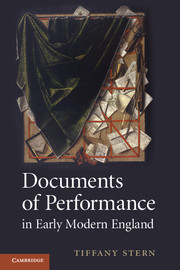Book contents
- Frontmatter
- Contents
- Acknowledgements
- Textual note
- Introduction: Playwrights as play-patchers
- 1 Plot-scenarios
- 2 Playbills and title-pages
- 3 ‘Arguments’ in playhouse and book
- 4 Prologues, epilogues, interim entertainments
- 5 Songs and masques
- 6 Scrolls
- 7 Backstage-plots
- 8 The approved ‘book’ and actors' parts
- Conclusion: Repatching the play
- Notes
- Bibliography
- Index
2 - Playbills and title-pages
Published online by Cambridge University Press: 18 December 2009
- Frontmatter
- Contents
- Acknowledgements
- Textual note
- Introduction: Playwrights as play-patchers
- 1 Plot-scenarios
- 2 Playbills and title-pages
- 3 ‘Arguments’ in playhouse and book
- 4 Prologues, epilogues, interim entertainments
- 5 Songs and masques
- 6 Scrolls
- 7 Backstage-plots
- 8 The approved ‘book’ and actors' parts
- Conclusion: Repatching the play
- Notes
- Bibliography
- Index
Summary
INTRODUCTION
On any single day a Londoner of the early modern period would be confronted with a widely different selection of plays to see: he or she could never simply know what was in performance the way we can now. That is because there was no fixed repertory. Tiny London of the early modern period could not sustain a long run of the same play as it would be unable to produce the audience for it. Hence the extraordinary fuss made when Middleton's politically provocative Game at Chesse was actually performed for an unbeatable nine days in a row. As Henslowe's ‘diary’ implies, it was normal to perform a different play every day, repeating it for as long as it brought in an audience, dropping it when it lost its appeal. Even a new play might not be performed above once, as chapter 4 illustrates. How, then, would a Londoner keen to go to the playhouse learn what plays were on offer at each theatre on a particular day?
There were actually a number of ways to obtain information about what was being staged. One was to attend a theatre and find out, or even determine, the play for the next day. At the end of each performance an announcement would be made asking the audience to sanction a particular choice of play for the following afternoon; Antimo Galli writes from London on 22 August 1613 telling how this task had fallen to his servant, who went to the Curtain and ‘at the end of the performance … invited the public to the play for the next day, and named one. […]
- Type
- Chapter
- Information
- Documents of Performance in Early Modern England , pp. 36 - 62Publisher: Cambridge University PressPrint publication year: 2009
- 2
- Cited by



